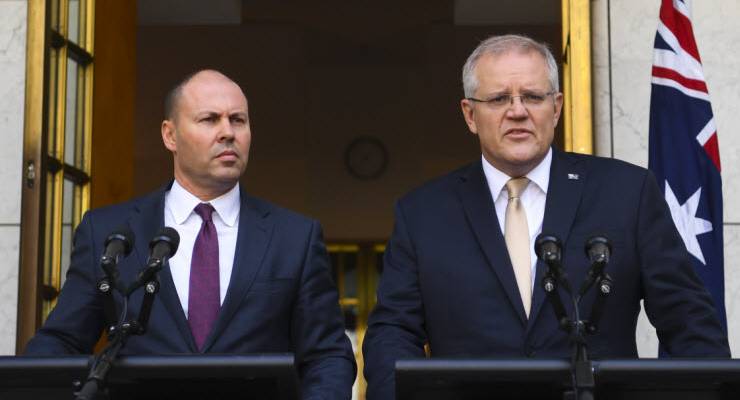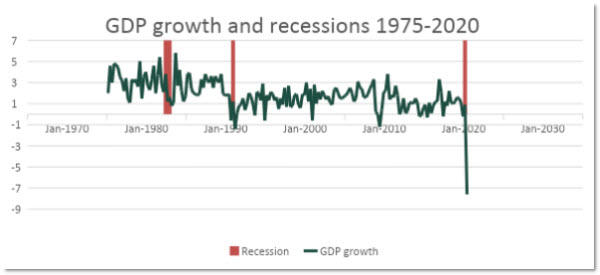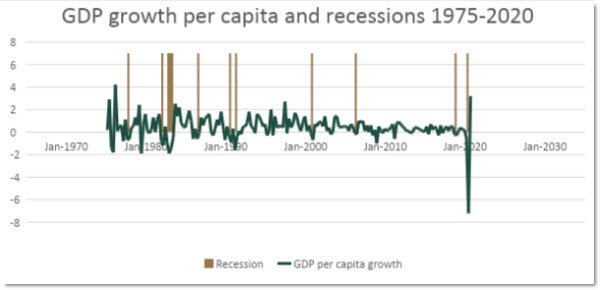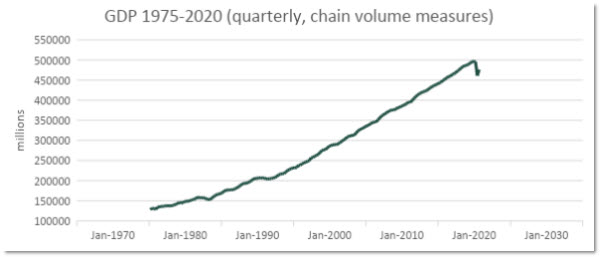
Before COVID-19, recessions were something associated with less lucky countries or far less fortunate times — at least for Australians under 40.
So the announcement of a recession in September was something of an anticlimax. Things were bad, but they had been bad since March. The unemployment rate rose just 0.1% in September, which, while terrible for those 12,000 or so people, was not as crushing as previous monthly rises.
The announcement of recession did not cause the sky to fall. The streetlights stayed on and, despite over a decade of the Coalition warning of the dire consequences of government debt, the international money markets did not turn off their lines of credit.
Then, just weeks later, we were told by media outlets (particularly the Murdoch-owned press) that the recession was over.
Sky News ran with “COVID RECESSION OVER: RBA forecast economic growth in quarterly statement” — and while the Reserve Bank (RBA) was quick to distance itself from the over-exuberance, such caveats were buried far below the headlines.
Last week the RBA confirmed a serious uptick of 3.3% in GDP growth, taking a significant bite from this year’s losses and again sparking “COVID recession is over” headlines. This is indeed a reason to be optimistic. Yet focusing solely on GDP data is lazy and dangerous, both for economists and journalists.
Just because GDP is growing, that does not mean we are back to any semblance of normality. Around 961,000 people are still out of work, and hundreds of thousands of others have traded full-time permanent contracts for part-time casual work. The economy remains in the deepest period of turmoil since the Great Depression.
There is a legitimate question, then, as to what use the term “recession” is.
One answer is that it’s useful for a certain type of politician when claiming to be a good economic manager. It shows that Australian accounts were in poor shape just twice between 1975 and 2019.

But there are major caveats when looking at GDP growth data: most obviously, it ignores the number of people needed to generate that wealth.
This is no trivial point. If we adjust GDP growth for population, the number of recessions over the 1975-2019 period changes dramatically. Instead of two recessions there are instead nine over that period, and five in the past three decades.
Simply by adjusting GDP for population growth the standard recession measure paints a very different picture to that touted by the “30 years of continuous growth” brigade.

If we look at the depth of the effect of COVID-19 on total GDP rather than GDP growth, the scale of the economic disruption becomes clearer. The economy has essentially lost all economic gains over the past three years, meaning that many years of very high growth will be needed to get Australia back to its pre-crisis GDP level.

And returning to this level does not mean that the crisis is over. The UK experience of the global financial crisis (GFC) is informative on this point. It took roughly five years for UK nominal GPD to return to the pre-GFC level. However, wages did not recover for a further two and a half years.
The point is that economic terms like “recession” are only really useful when they relate to the lived experience of the majority of people.
This year, millions of households have emptied a large portion of their superannuation pots to cover the costs of the recession. Even before the crisis, workers experienced seven years of stagnant wages, while underemployment had been over 8% since 2014. Insecure work had been climbing steadily and company investments were at record lows in 2019.
Clearly the economy was in trouble long before the GDP figures turned negative. A return to “normal” is simply not a possibility.
Luckily, there are alternatives to discussing recessions. For example, the United States uses (among other measures) the “Sahm Rule”, which looks at the level of unemployment relative to the previous 12 months.
This is a far superior measure than GDP or GDP per capita, since it relates the recessions to the labour market experience of the population.
Some economists take this measure further to incorporate underemployment as well as unemployment. By this measure Australia was in recession in 2009-10, and in 2014 when the underemployment levels plateaued at over 8%.
In times of unprecedented crisis, people need a vocabulary to describe what it is they are experiencing. For economists and journalists, this means listening and adjusting our measures accordingly.








definition of ‘recession’ needs “reforming, refining and reimagining — right now”
Quite right. Unfortunately, there is reason to doubt the government would ever do such a thing in good faith. On the contrary it consistently reforms, refines and reimagines the definitions of such terms to obscure, confuse and bury all inconvenient news. For example:
Unemployed – the naive might think anyone not employed is unemployed. This is of course very far from the government’s idea of who is unemployed.
Poverty – the government refuses to define this at all.
Inflation, cost of living – The government’s position here is “That’s my definition, but if you don’t like it, I have others.”
Ministerial conduct, minimum standards. Ha ha ha.
Global warming, carbon emissions measurement – you get the idea…
An excellent article to just start the debate. In fact we need an entire re-think of pretty much everything we measure. We account for the fish we reap from the oceans, but not the loss of fish. We account for trees cut down, but not the loss of forest and biodiversity, we account for manufactured goods, but none of the environmental despoliation that made them (like mobile phones, blimey).
And with employment, we count who are in jobs, in a tightly defined unemployment, but don’t measure the precarious of that employment.
We count the quantity, but quality is just too hard for us. And then we put the quantity high on the mount, written on tablets, and genuflect before its munificence.
We are a dumb species, given intelligence only to behold our stupidity.
Precarity, not precarious. Spell check says precarity isn’t a word. Who knew?
Issue of using headline data for analysis that goes against principles of statistics 101; doesn’t prove anything.
One needs to drill down into sectors, occupations, legal status, postcodes, households, age, gender etc.; it’s a very complex field but presented simplistically to attract simplistic solutions (libertarian conservatism 101) .
Just related to status we have baby boomers in transition still working full time, part time or already retired. Younger generations studying but doing (often precarious) part time or gig work, then related elephant in the room.
So called ‘immigration’ of workers inflated via the NOM is dominated by students and backpackers with limited work rights. Further, for every international student working full time (naughty) there is another who has no need to work; majority are in between doing part time work.
Australians are the recipients of very poor information and analysis of data, supposedly reflecting the nation and especially employment, or not.
This article is trying to describe how wording can manipulate people and pretty much just be a vehicle to camouflage the actual fact.
The most common form in politics is to associate the new meaning for a term or word with economics,, arguably the most successful of these is/was economic rationalism.
rationale meaning• /ˌraʃəˈnɑːl/
a set of reasons or a logical basis for a course of action or belief.
Rational based on or in accordance with reason or logic.
“I’m sure there’s a perfectly rational explanation”
h
late Middle English (in the sense ‘having the ability to reason’): from Latin
noun
noun: rationalism
Translate rationalism to
Use over time for: rationalism
https://ssl.gstatic.com/onebox/dictionary/ngram/en/desktop/a91d4ad621c92a6db8e9527918342ea5d0c36823.png
Our lived experience when it hit here in the early 80s is the removal of , egalitarianism, quality of life, environmental concerns.
From a wealthy or economically aggressive person the rationalism was/is that it is logical that they deserve more, our pool of politicians seem to be in this group and/or cannot function without their blessing.
..following on from” my awaiting approval” on the way the term economic rationalism is a prime example of using terminology that has a finance orientated basis to help obscure the true meaning, I contend that my personal experience is that environment, egalitarianism and quality of life have taken the greatest impact.
It may be that any comment put forward here has to state that it is the posters “own personal opinion”, or was it describing a group of people as “financially aggressive and/ or wealthy”.?